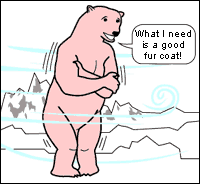Because natural selection can produce amazing adaptations, it’s tempting to think of it as an all-powerful force, urging organisms on, constantly pushing them in the direction of progress — but this is not what natural selection is like at all.
First, natural selection is not all-powerful; it does not produce perfection. If your genes are “good enough,” you’ll get some offspring into the next generation — you don’t have to be perfect. This is apparent in the populations around us: people may have genes for genetic diseases, plants may not have the genes to survive a drought, or a predator may not be quite fast enough to catch her prey every time she is hungry. No population or organism is perfectly adapted.
Second, it’s more accurate to think of natural selection as a process rather than as a guiding hand. Natural selection is the simple result of variation, differential reproduction, and heredity — it is mindless and mechanistic. It has no goals; it’s not striving to produce “progress” or a balanced ecosystem.
This is why “need,” “try,” and “want” are not very accurate words when it comes to explaining evolution. The population or individual does not “want” or “try” to evolve, and natural selection cannot try to supply what an organism “needs.” Natural selection just selects among whatever variations exist in the population. The result is evolution.


